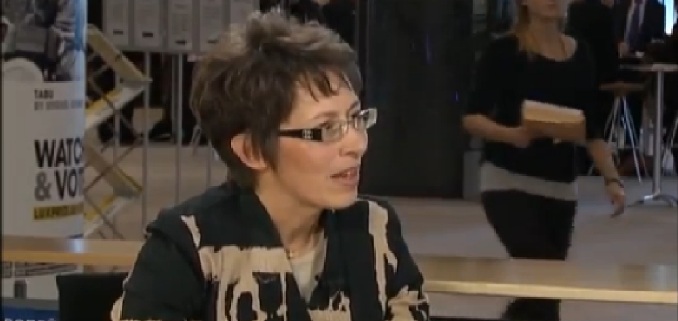Sari Essayah is no typical E.U. parliamentarian.
The bespectacled Finn is a retired world-champion race walker, who inherited her distinctly non-Finnish family name from a Moroccan father. And while Essayah had little contact with her father growing up, something of the Middle East and North Africa appears to have stayed with her: She has become one of the European Parliament’s go-to legislators on the region.
Essayah first entered Finland’s parliament a decade ago, representing the Christian Democrats. In 2009 she moved her family to Brussels to join the European Parliament (EP), the EU’s 754-seat lower house of legislature (its upper house is the 27-member Council of the EU). Today she is a member of the European People’s Party, the center-right alliance that is the EP’s largest voting bloc.
The 46-year-old is member of the parliament’s delegation to Israel, and of European Friends of Israel, an umbrella group of pro-Israel national caucuses that numbers some 300 legislators. She is also a member of the EU delegations to the Maghreb (North Africa) and to the Union for the Mediterranean – a grouping of Mediterranean Basin states that includes Israel and all of its neighbors.
“Some MEPs understand the whole picture, and others just look issue by issue. It’s sometimes hard to persuade those MEPs with narrow views about anything,” she told The Tower last week at her office in the sprawling European Parliament building. “I’m always amazed at how people in this house have such a light understanding of Middle East history.”
Essayah cited a 2011 poll from the U.S.-based Pechter Polls and the Council on Foreign Relations that found most Arab residents of East Jerusalem prefer to remain under Israeli rather than Palestinian sovereignty. The results, she said, surprised members of the EU’s delegations to both Israel and the Palestinian Authority.
Essayah criticized the E.U.’s tendency to view Israel through the lens of the peace process.
“I think it’s a shame we condition everything on the peace process. You need two to tango, and it’s the Palestinian side that’s unwilling to come to the table,” she said.
In contrast to U.S. policy – which views Jerusalem as a subject for final-status negotiations – the E.U. explicitly expects that Jerusalem will be divided as the capital of Israel and of a future Palestinian state. But while EU diplomats often meet Palestinian counterparts in the city, they rarely meet with Israelis there, even in the western portion that is by consensus Israeli. Brussels is by far the biggest single donor to the PA, providing 200 million euro annually.
In 2008 the Israeli organization NGO Monitor revealed that Ramallah was using EU aid to pay the salaries of Palestinian prisoners held in Israeli jails on conviction of murdering civilians.
Since entering parliament, Essayah has played a leading role in pushing her colleagues to demand greater supervision of how EU aid money is used by the Palestinian Fatah faction that controls the Palestinian Authority.
In 2010 she submitted a “parliamentary question” asking the European Commission – more or less the EU’s cabinet – for greater transparency in aid to the PA. The question is here and the Commission’s response is here. In March of this year she filed yet another question to the Commission and is still awaiting a response.
Essayah is even more concerned about Fatah’s rival Hamas.
“Hamas is on the EU list of terrorist groups. I’m worried that in this house are many MEPs who think it should be taken off that list because it’s democratically elected,” she said. “The precedent of Northern Ireland is often raised – that violent groups have been made into groups that are merely political. I think that’s impossible as long as Hamas’s main goal is to wipe Israel off the map.”
And then there is Hezbollah.
Though the EU first blacklisted Hamas a decade ago, it has shown far less enthusiasm for doing the same for Hezbollah. So far only the Netherlands has out-right listed the Lebanese Shiite movement as a terrorist group, while Britain has blacklisted only its military wing.
Hezbollah’s culpability for last year’s deadly terror attack against Israelis in Bulgaria, and in planning a similar attack in Cyprus, may coax Brussels out of its complacency. On Tuesday, Britain filed a formal request to the EU to label Hezbollah’s military wing as terrorists, and once-reluctant Germany is reported to be on board.
The EU legislature has little to no say in determining Europe’s terrorist list – that responsibility falls to the Commission and to a special working group on the issue that meets just twice yearly. Its next session is scheduled for June. That may be helpful for those who seek a designation.
“With such voices in parliament about Hamas, I’m skeptical this house would support blacklisting Hezbollah,” Essayah said. “Nobody really talks about that question here – it hasn’t been an issue.”
Even if Brussels and Jerusalem don’t see eye to eye on all issues, lately their commercial ties have improved.
Bilateral trade reached nearly 30 billion euro in 2011, and the two sides have signed special trade agreements in agriculture, industry, and research and development. Some 40 percent of Israel’s imports came from the EU, and a third of its exports went there, behind only the United States.
Essayah lamented that some European lawmakers show the same lack of nuance in comprehending the motives of terror groups as they do on Israel.
“If you understand from how many countries Israelis come from, you realize the Israeli population is very, very diverse,” she said.
Recalling a recent trip to Israel with the EU delegation, she observed, “We Scandinavians are more reserved and modest, but it was nice to see the Mediterranean culture of debate in the Knesset, with hands flying everywhere.”
“There’s a saying that whenever two Jews sit in a room, there will be three opinions,” she added with a chuckle.
[Photo: RTVEurope / YouTube]




